Will Scotland's baby steps be enough to stop brutal Wales?
- Published
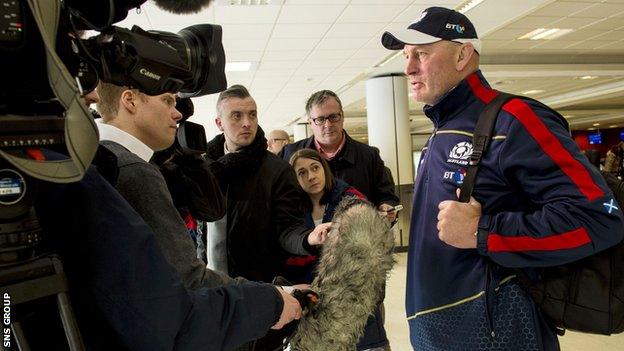
Cotter faces the Scottish media at Edinburgh Airport
Six Nations: Wales v Scotland |
|---|
Date: Saturday, 13 February Venue: Principality Stadium, Cardiff Kick-off: 16:50 GMT |
Coverage: Live on BBC One, live commentary on BBC Radio Scotland, Radio 5 live sports extra, BBC Radio Wales, BBC Radio Cymru & BBC Sport website and BBC Sport app, plus live text commentary. |
These Scotland press conferences are becoming painful, for the players, the coaches and the humble scribblers who turn up with their notebooks full of the same questions they had the last time and the time before that and the time before that.
They're the same because nothing changes, not in terms of Scotland's bottom line at any rate.
Everybody wants a twist in their Six Nations story - a win, remember those?
You're more likely to find a hen's tooth in the car park at Murrayfield than a Scotland player on the training ground beyond who is rich with stories of success - even moderate success - in this unforgiving championship.
Thursday was another treadmill day. Running to stand still. One change to the team - Duncan Taylor, the admirable Saracen, in for the injured Matt Scott in the midfield - but zero difference in the questioning.
Damned by sorry statistics
What else is there to say? Eight straight losses in the Six Nations. Eight straight losses to Wales, too.
Put another way: one win in 12 against Saturday's opponents. Or another: one win against the Welsh since Jonny Gray learned how to tie his own shoelaces.
We fetch-up at Scotland press conference carrying rugby's equivalent of ticking bombs in our bags, a volume of statistics so damning of Scotland's all-round hopelessness going back so many years that we dare not detonate them in ear-shot of a player or a coach.
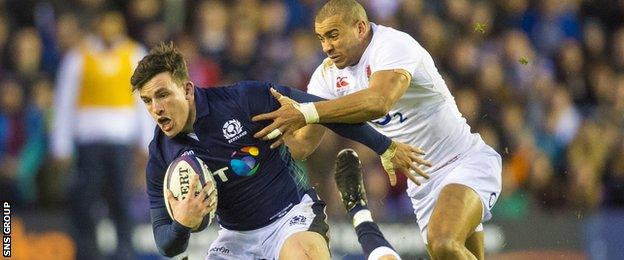
Scott is the only player to drop out of the starting XV, through injury
It's uncomfortable enough as it is without dropping S-bombs. Stats, they say, are there to be twisted and turned, rewritten and broken. But with Scotland, there's no room for interpretation and ambiguity.
They're as straightforward and as damning as can be.
Cotter sees positives - and fair enough. They're there, for sure, but they haven't come together in sufficient number to add up to a win on his watch in the championship.
Baby steps for Scotland
The team he inherited gave away too many penalties, coughed up too many lineout balls and got beaten in too many scrums. Scotland have advanced in all of those departments - and others.
You wouldn't know from watching Saturday's 15-9 loss to England, but when the stars are aligned, Scotland's attack is better than it was. Its defence doesn't look to have the gaping holes it has had for the longest time.
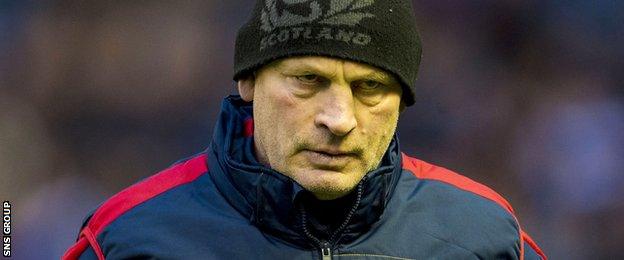
'Internally we know we're on the right track,' said Cotter
None of this has brought a win, though. They're steps forward, but baby steps.
"It's just maintaining the vigilance and concentration that you need to put away games," said Cotter. "For long periods of the game last weekend we were in it, we dominated. We didn't score off two critical situations and if we had, perhaps, the result could have been different."
That's the recurring mantra. Things could have been different if...
"It's just a matter of believing in what we're doing," Cotter continued. "Six points away from England. A try away from a win. There's a positive feel within the team but we're not happy because we're not winning.
BBC Scotland's Six Nations Extra
"We're getting ourselves into situations where we can win and that's exciting and hopefully we'll get ourselves into the same situation this week and put in place the things we worked on during the week.
"Hopefully they'll get the opportunity to nail a big game and when we do that maybe things will become much easier."
Wales drew with Ireland in Dublin. As a Test match, it was well ahead of anything we saw at Murrayfield 24 hours earlier. It was more intense, more accurate, more brutal. It was no oil painting in its beauty, but even Cotter admitted that Wales and Ireland showed that they were "ahead of everyone else."
Brutal game works for Wales
The Welsh are a bit of an optical illusion. Scan their starting line-up and they're a side with pace, power, wit and game-breaking threat. In reality, they've got the power covered, but the wit and the creativity goes missing.
They're not quite one-dimensional, but much of what they do is based on brute force. Hence, the massive physical toll it takes on them. They play hard, direct, largely risk-free rugby.
They bang away at an opposing defence waiting for it to crack under the bombardment rather than using their skill and pace to unlock it.
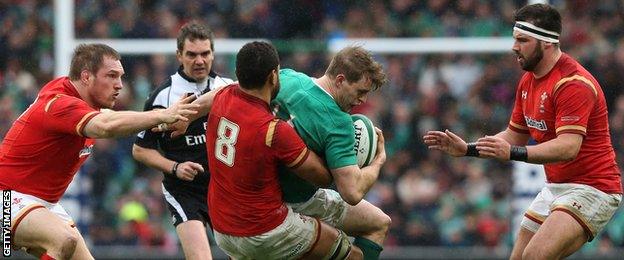
Wales are a powerful side and have not lost at home to Scotland since 2002
Against Ireland they made zero line breaks and just two offloads. Warrenball is attritional and not always easy on the eye, but it has served them well in the Six Nations.
A depleted Ireland - shorn of so many front-liners - still matched Wales' physicality and got a result many thought was beyond them in their weakened state. Ireland's powers of concentration and discipline and line speed in defence were huge.
They had inexperienced Test players stepping up to the plate, carrying ball prodigious amounts of ball, making a vast number of tackles, constantly troubling Wales with their intensity.
Now it's Scotland's turn. Cotter spoke of the need to be clinical. They weren't against England. In truth, taking their chances when they arise is a trait that has been beyond Scotland for a dozen years and more.
"To put everything into perspective, we lost by six points to England and we're not happy about that because we had opportunity to win it," said Cotter. "I'd rather be in a situation where we can win rather than be 20 points behind and have no chance whatsoever.
"We've spent another week together and the weather has been nicer to us. We've been able to train without that horizontal rain and sleet."
They've had enough storm clouds to last them a lifetime. The roof will be closed in Cardiff, but if a minor miracle happens and Scotland get the win they so desperately crave they'll still be able to see the sun through all that steel.
- Published11 February 2016
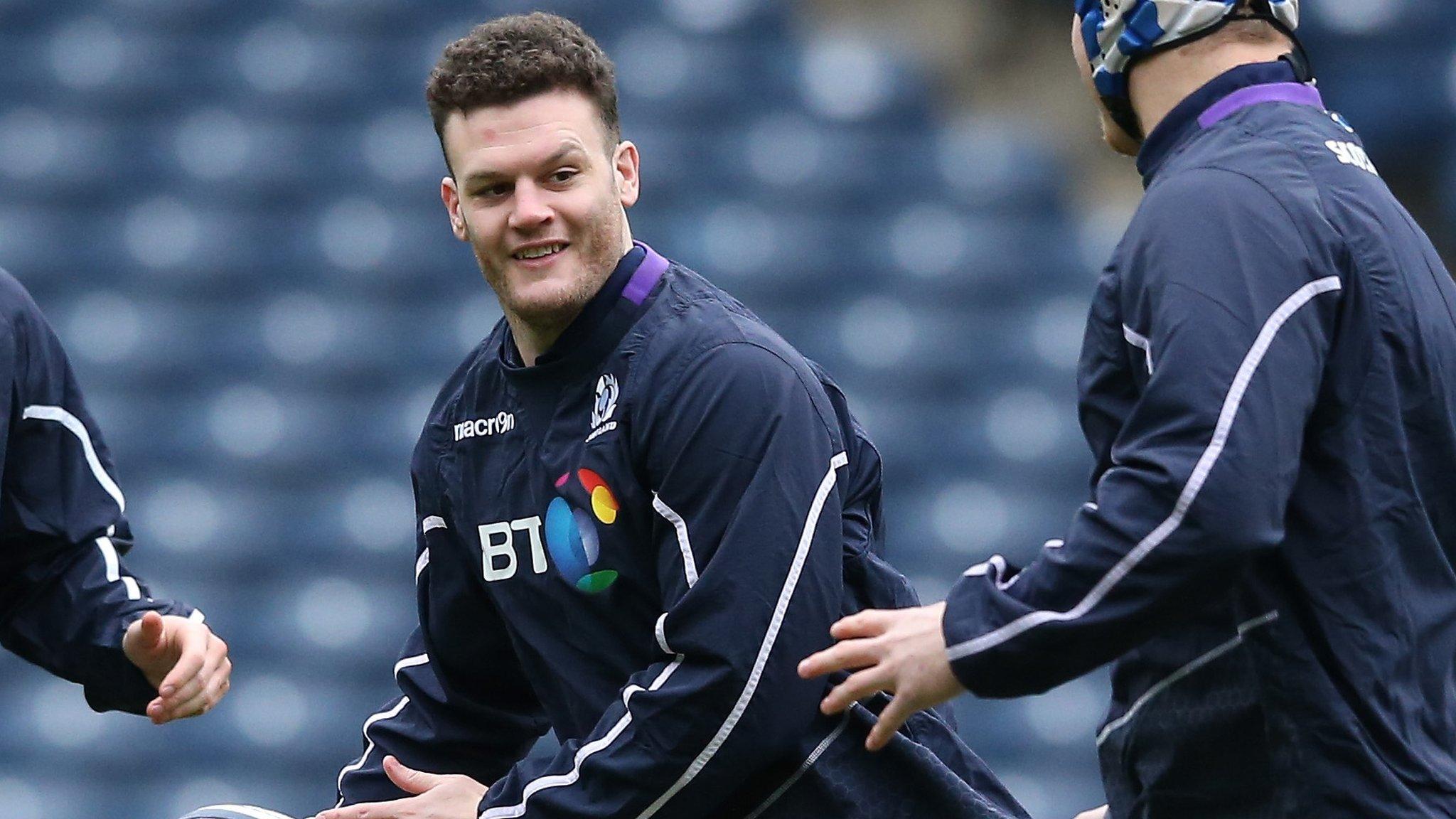
- Published11 February 2016
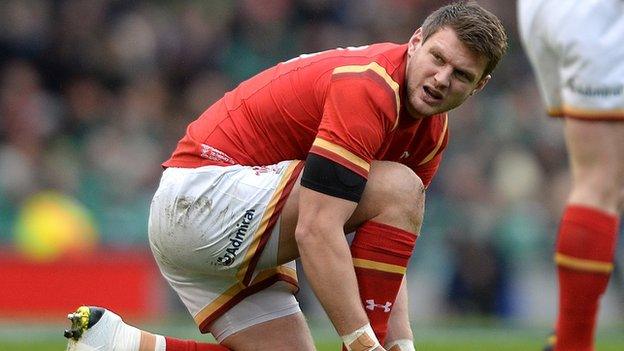
- Published9 February 2016
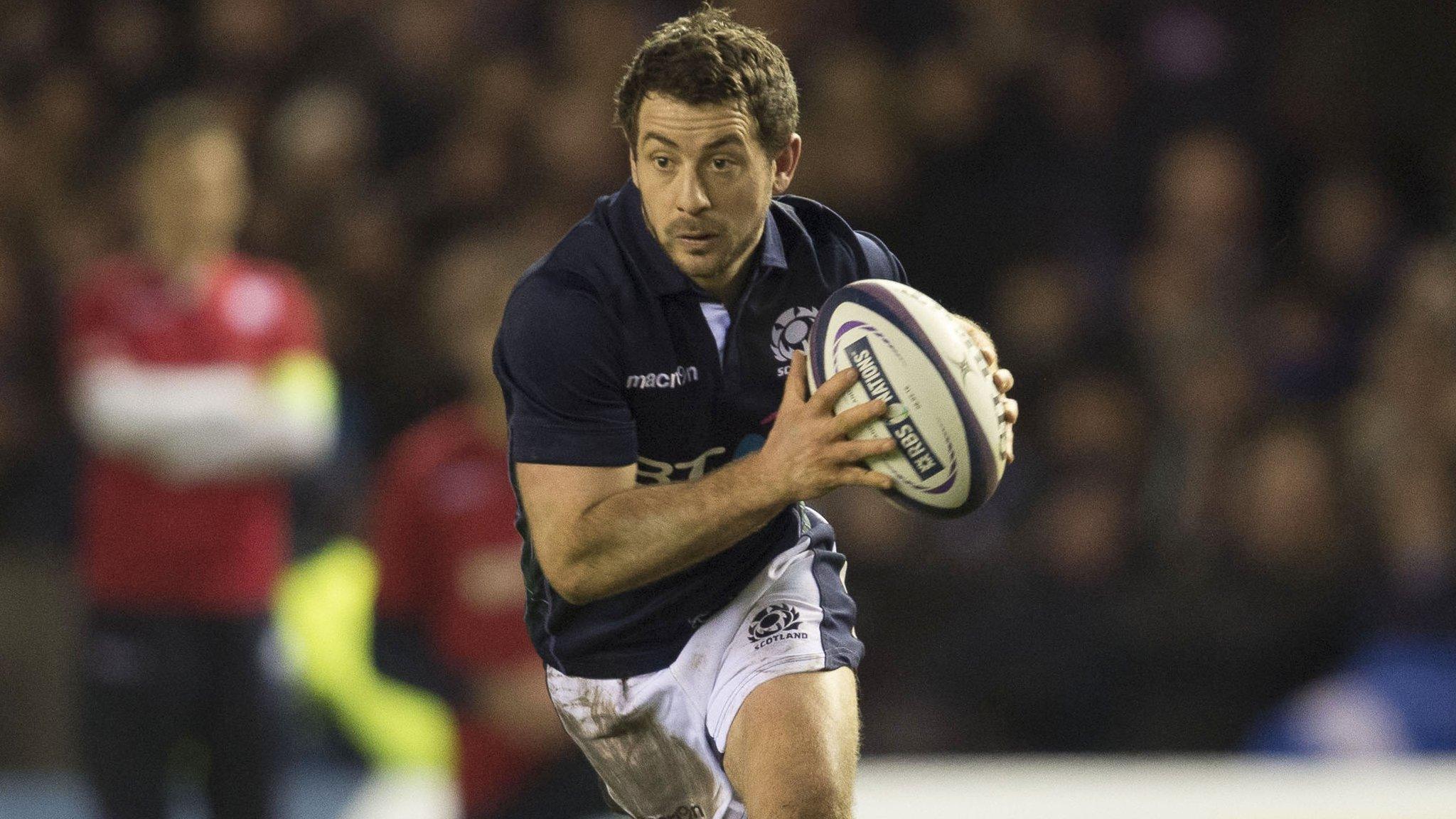
- Published14 September 2016
